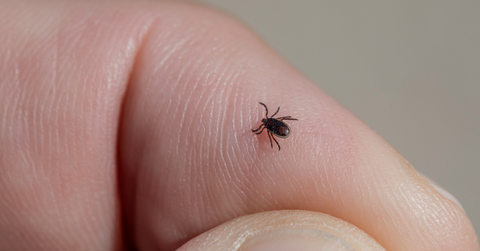Understanding the Possibly Fatal Alpha-Gal Syndrome, the Meat Allergy Caused by Ticks
The first-ever AGS-related death was reported in 2025.
Published Nov. 14 2025, 2:20 p.m. ET

It used to be that Lyme disease was the biggest thing that people had to worry about when it came to tick bites. However, in 2002, alpha-gal syndrome (AGS) reports started coming in.
The condition presents as a meat allergy, and those who contract AGS report experiencing a severe allergy to meat within a few hours of eating. The condition can cause more than just digestive upset, highlighting the importance of protecting yourself from ticks in the first place.
However, with as relatively new to the scene as alpha-gal syndrome is, many people don't really know much about the meat allergy caused by tick bites.
Interested to learn more about AGS and its symptoms and causes? Keep reading as we break them down for you, including details about the first-ever AGS-related death that was reported in 2025, nearly two decades after the syndrome was first discovered and given a name by the medical professionals treating it.

How do you test for alpha-gal syndrome?
As we explained, AGS is caused by tick bites. According to the U.S. Centers for Disease Control and Prevention (CDC), some of the first symptoms of AGS include:
- Itchy rash or hives
- Vomiting, nausea, or diarrhea
- Stomach pains
- Indigestion or heartburn
- Difficulty breathing, shortness of breath, or cough
- Significant drop in blood pressure
- Swelling, especially above the neck
- Feeling faint or dizzy
- Symptoms of anaphylaxis
However, the only way to be certain that AGS is behind your symptoms is a blood test.
The test will be performed in conjunction with a complete medical history and exam, according to the Mayo Clinic.
However, AGS is tricky to diagnose based off of bloodwork alone, since a person can test positive for having alpha-gal antibodies without actually having AGS. But, once you receive a diagnosis, your doctor will give you instructions on treatment, which includes avoiding the foods that cause an allergic reaction. These include whole meats, as well as some meat extracts.
Does alpha-gal syndrome go away?
There's good news for those who have been diagnosed with alpha-gal syndrome. According to the Mayo Clinic, food allergies can go away over time. Of course, if you are experiencing the more severe symptoms of AGS, you should talk to your doctor before attempting to eat any allergens. That's because extreme reactions to meat can prove to be fatal.
Sadly, one family is reeling from the death of a 47-year-old father, who died after eating a hamburger at a backyard BBQ during the summer of 2025.
According to a study published in The Journal of Allergy and Clinical Immunology, the AGS-positive airline pilot first started experiencing symptoms a year before his death. After being diagnosed with AGS, it sounds like he mainly avoided eating the items that made him violently ill until that fateful BBQ.
Sadly, his son found him unconscious in the bathroom in a pool of his own vomit a few hours after the party, and he died in the hospital later that night.
His story highlights just how serious AGS can be, and the importance of ensuring that you take protective measures whenever you are in areas where ticks are known to live.